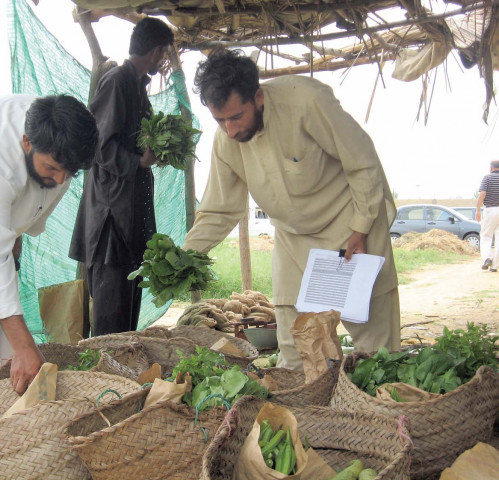Going, going, gone
The small group of people who practice and promote organic farming, also point out that it is the healthier option

“By growing our own vegetables and herbs, we can reduce the market demand and prices would eventually fall,” says Abbas Raza, who stepped into organic farming five years ago.
However, the small group of people who practice and promote organic farming, also point out that it is the healthier option, not just for us, but for the soil as well.
Blessing in disguise?
Although the majority of growers in the country are not yet sold on the idea of organic farming, experts believe that the floods have provided them with an opportunity to reconsider their priorities. “Most of our land is addicted to chemical fertilisers that cost a fortune,” says Raza.
Now that the soil is fertile because of the floods, farmers will not need fertilisers for a while and this could be an opportunity to convince farmers to revert to organic farming.
“This should be done not only to produce safer and healthier food, but also to maintain healthy soil and high productivity in the years to come,” says Muzammil Niazi, owner of a small organic farm called Sungold in Malir, Karachi. “This will reduce the farmers’ dependency on laboratory-modified seeds [that cannot reproduce], chemical fertilisers and pesticides.”
Unlikely beginnings
Muzammil set up Sungold on six acres with the help of his wife Rabia Niazi three years ago. An aerospace engineer by profession, he connected with agriculture during a brief term in prison.
Accused of corruption by the National Accountability Bureau while working for the Pakistan Army and later cleared of charges, Muzammil says that “imprisonment helped [him] come close to nature”.
“As a prisoner in a cell, I would think how one can utilise that small space for something bigger and that is when I decided I wanted to get into agriculture,” says Muzammil. He has been juggling his truck business along with farming since his release.
Today, his team of eight to 10 organic farmers grow chemical-free, naturally grown broccoli, carrots, lady fingers, bitter gourd/melon and eggplant among other crops. “The wheat is also naturally grown and our meat is 100 per cent organic as well. We don’t have battery chickens here.”
The farm relies on natural cultivation, sometimes using earthworms to create compost and employs men and women from the nearby village. “I wanted to increase employment in the area, particularly among women who I think are better managers when it comes to money,” says Muzammil.
He wants to highlight the idea of organic farming and provides organic products at his customers’ doorstep.
Vegetables from his farm are also supplied to organic restaurants such as N’eco’s Natural Store and Cafe in Karachi. “Organic food is not just healthy, it is also tastier,” adds Muzammil, “but people have yet to understand its significance.”
This is evident from the small number of customers the farm has. “Right now we have about 100 loyal customers,” says Rabia, adding that the number is rising steadily.
“Our customers are fond of us because our products are 100 per cent fresh,” says Khialmat Khan, Sungold’s distribution manager. “We take orders through SMS and email and deliver freshly picked vegetables the next morning.”
Mixed cropping
Sungold also practices mixed farming rather than monoculture farming. The latter means growing one crop on a large piece of land with the danger that one infected plant can destroy the entire crop.
“By planting two or more varieties in the same area, you can keep the pests away because bugs that are attracted to one crop may find the crop around it repelling. But this requires a fair amount of research to understand which crop can act as a repellent yet grow in the same climatic condition.”
Low yield, high cost
In spite of organic products’ health benefits, organic farmers complain that they have to compete for shelf space because of their comparatively higher prices. Most people are not willing to pay extra for fruits and vegetables that are smaller in size than vegetables sold by vendors, says Raza.
Raza, whose products are sold under the label Mom’s Garden, drew inspiration from his mother’s kitchen garden and decided to ‘go organic’ five years ago.
Guaranteeing preservatives and artificial additives free products, Raza supplies a wide range of herbs and vegetables, but is barely able to break-even. “Our yield is low and costs high,” he says.
Niazi agrees. With a salary bill of Rs40,000 and an additional supervision cost of Rs16,000, he is barely left with any profit at the end of the day, he says. “For us to break-even, we will have to sell at least 1,000 kilogrammes (kg) of vegetables every month. But such yield is not possible with natural seeds.”
If a 100 square-feet land produces 10kg of crop in the first harvest, in the second harvest it will produce 8kg and in the third 5kg, he explains. “This is normal. If you want to keep your land free from chemicals, you will have to respect the way nature takes its course. But people don’t understand this and farmers are compelled to use laboratory-modified seeds for mass production.”
Samya Mumtaz, the founder and former owner of Dali Foods, seconds this.
Mumtaz, who is based in Lahore, stepped into traditional farming 17 years ago and is currently running a health store that stocks health foods, snacks, dry fruits and skin and hair care products that are either organically grown or naturally prepared. The store also stocks organic whole-wheat flour, brown rice, multi-grain flours and brown rice kheer among other items.
As a student of development studies, she felt that the country’s debt is linked to the government’s lack of interest and investment in the agriculture sector, which is the backbone of Pakistan’s economy.
“Right now organic adds a snob value, which is why only those who can afford to buy organic products go for them.”
But Raza says he understands that at a point when affording sufficient food is an uphill challenge for many, organic varieties cannot be a priority. In the long term though, he feels that going organic can actually reduce the amount we spend on food.
Experts hope that by returning to organic farming we can not only produce safer and healthier food, but also maintain healthy soil and high productivity in the years to come. This can only be possible if we keep the soil chemical free.
“A change will only come when we set our priorities right,” says Raza. “That is, when we put health ahead of economics.”
Published in The Express Tribune, September 7th, 2010.



















COMMENTS
Comments are moderated and generally will be posted if they are on-topic and not abusive.
For more information, please see our Comments FAQ